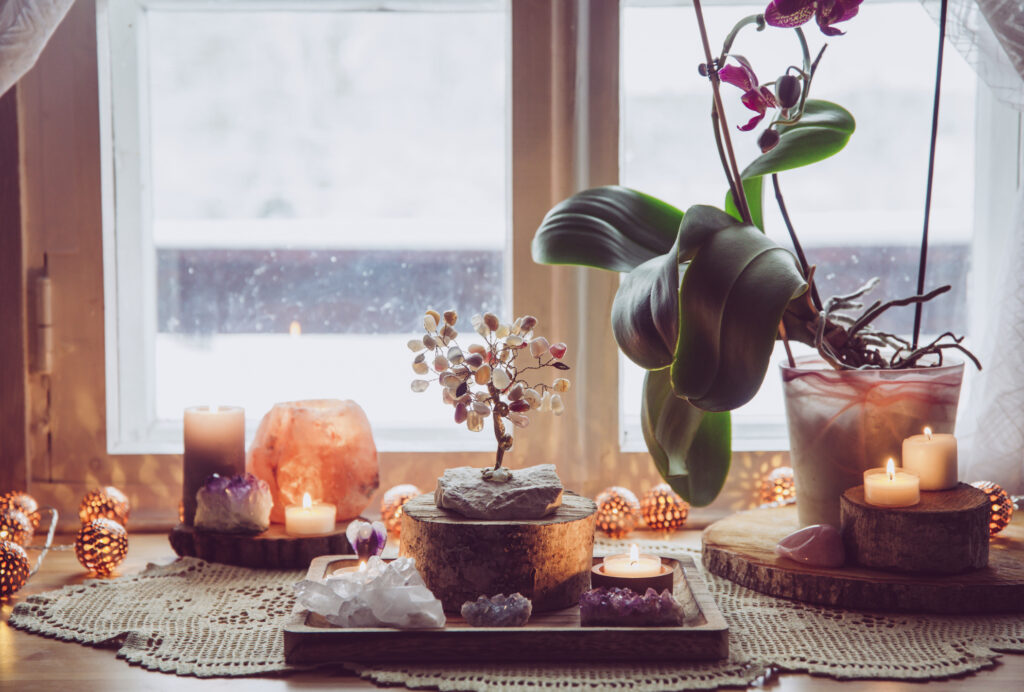Do you perpetually have problems sleeping? Does something feel off in your living room? Are you stressed every time you set foot into your home office? It’s quite possible that your abode needs a feng shui makeover. This ancient Chinese art is based on the principle that you are affected by the energy that exists in your surroundings. Practicing feng shui can give you the tools that will help this energy flow properly, resulting in more clarity, joy, and purpose in your daily interactions. The best part is that feng shui takes minimal effort yet it can have a huge effort on your wellbeing. To help you get started here’s an intro into feng shui basics.
Feng Shui Colors and Elements
Before getting into the core feng shui rules, it’s important that you have an understanding of the importance of feng shui colors and elements in terms of how they relate to your physical and mental wellbeing. The five elements — wood, fire, earth, metal, and water — each possess a particular energy, so it’s important that they are placed in the correct places within your home in order to help support your wellbeing, as well as your goals. Each element also corresponds with specific colors that should be introduced into your home in a specific amount — too much of one can block out the energy of another, thus creating an unbalanced environment. Here’s a more detailed overview of the five Chinese elements that create a harmonious feng shui home.
Wood
- What it influences: Your health, family life, and finances.
- Where it should be placed: The northern part of your home.
- What it can bring: Abundance, growth, and vitality.
- Colors: Shades of green and brown.
- Home design tips: Live plants, foliage, wood furniture, and natural fabrics like cotton.
Fire
- What it influences: Love life and personal success.
- Where it should be placed: The southern part of your home.
- What it can bring: Recognition and achievement within your career.
- Colors: Reds, yellows, and shades of orange, purple, and pink.
- Home design tips: Colorful artwork, candles, and natural light.
Earth
- What it influences: Stability and peaceful relationships.
- Where it should be placed: Southwest or northeast directions.
- What it can bring: Spiritual growth, ambition, and focus.
- Colors: Light yellows, beige, skin tones, and sandy hues.
- Home design tips: The color of your walls and pieces of furniture.
Metal
- What it influences: Creativity and luck/blessings.
- Where it should be placed: Northwest or western corners of your home.
- What it can bring: Mental clarity and a sharp mind.
- Colors: White, gray, and silver.
- Home design tips: Objects made of iron, gold, silver, aluminum, or stainless steel; can be balanced with splashes of color from the fire element.
Water
- What it influences: Career and life path.
- Where it should be placed: Northern part of your home.
- What it can bring: Wisdom and insight into making the best life decisions and wealth and improved financial outlook.
- Colors: Deep, dark shades of blue and black.
- Home design tips: Reflective surfaces and anything with water, so think mirrors, aquariums, fountains, etc.
Feng Shui Rules for Your Home
Now that you have an understanding of how the elements and colors work influence your living space, it’s time to take a look at some additional key rules for each room in order to create the perfect feng shui home.
Entryway
The entryway to your home is the first impression you, your family, and guests have. According to the principles of feng shui, this space is known as “the mouth of qi” and it’s one of the most important spaces to have perfect feng shui. The front door is literally a portal for all qi (aka life force energy) to enter your home, as well as your life. Tips:
- Make sure the space is clutter-free, so designate a separate area for coats, shoes, and other personal belongings.
- Check that the doorbell and/or knocker are working at all times.
- Choose a strong and welcoming door and maintain wear and tear such as cracks, peeling paint, and even dirt and mud.
- Don’t have a mirror facing the entryway as it reflects/pushes any positive energy out the front door.
- Choose an entryway rug with features that represent the direction in which your house is facing.
- Have ample lighting so that the entryway is well-lit from the inside and the outside.
- Avoid plants and bushes with pointy or spiked leaves as they can create negative energy. Opt for flowers and lush, soft greens instead.
Hallways
Many people often forget about hallways, but they are just as important as other areas of the home because they are the passageways where we distribute the qi around our homes. Tips:
- Keep all hallways well lit.
- Incorporate photos and artwork, but don’t overdo it. Arrange these pieces in an artful way.
- Create a focal point in the hallway. This could be a section of the wall that’s painted in a different color or hanging something like a mural on a plain colored wall.
- All hallways should be clutter-free, not only because hallways are generally small spaces, but clutter represents obstacles in your life.
Kitchen
The kitchen is another extremely important room to have good feng shui because it epitomizes health, wealth, and abundance. Literally how and where you eat is a reflection to how you present yourself to others. Tips:
- Clean the spaces you are utilizing immediately after cooking and eating. That means no scraps of food or dirty dishes in the sink.
- Avoid hanging heavy items like pots from the ceiling as this only creates angst and negative energy.
- Keep all appliances in good shape and repair/replace as needed — especially the stove as it symbolizes prosperity and good health.
- Incorporate the elements with the use of paint.
- Hang a mirror behind the stove so that you’re in the command position.
- Fill the empty space above the cabinets with tasteful decor to prevent negative energy from collecting.
- Keep the fridge, freezer, and cupboards tidy and discard any old or expired food.
- Turn on the stove at least once per day (even heating up water for a cup of tea) as it helps maintain active energy.
- Create good energy by bringing in natural light, as well as incorporating the correct lighting fixtures to ensure that your kitchen is always bright and cheerful.
Dining Room
The dining room represents the relationships you have with your loved ones. Obviously, you’re going to want the space to feel welcoming. Tips:
- Try to reserve your dining room table for meals only but if you do use it for work or craft/homework time for your kids, make sure it’s completely cleaned off before sitting down to eat.
- When it comes to centerpieces, opt for fresh flowers as they emulate positive energy and improve relationships with others. A bowl of fresh fruit is another great option as it symbolizes abundance.
- Fill this space with cheerful artwork or pictures but avoid any electronics, including clocks as they are a reminder of passing time. According to the principles of feng shui, the dining room should be an eternal space.
- Avoid putting your table straight and parallel with the walls. This causes chi to be channeled in a straight line or around the edges, making it more susceptible to becoming trapped in the corners.
- If possible, place all the seats so that nobody has their back to a large window or door — this can make a person(s) in this position feel insecure. Keep in mind this can be tricky to accomplish with round tables.
Living Room
As with the dining room, the perfect feng shui living room should be an inviting space that can be enjoyed by family and friends. Tips:
- Incorporate lush house plants to help promote personal growth, compassion, and physical and mental health.
- Arrange all seating in a commanding position, meaning place it where you can still see the door/exit but without being directly in line with it. This will help you be the commander of your own energy. Of course, you want to keep functionality in mind, too.
- It’s important to make sure you allow for the flow of movement to and around the furniture. With that said, don’t incorporate pieces like an unnecessary table if it’s only obstructing the life force energy.
- Choose decor and accessories wisely as they heavily influence how you and others feel when they’re in the space.
- Use the five elements as a decorating tool based on the type of energy you would like to create in the space.
Family Room or Den
Unlike the living room, a family room (or den) is more of a place to chill out, relax, and entertain yourself. Tips:
- Place a throw rug or carpet in the center of the room to connect everyone in your household.
- Choose the five element colors that evoke the mood you are trying to create in the space. So, for example, that would be earth hues if you want to promote harmonious relationships.
- Make sure there’s ample seating so that everyone in your home can be comfortable in this space.
- Put the television in a thoughtful place. Choose a focal point that still allows for you to have a conversation with others.
- Choose furniture with round corners as sharp corners can obstruct the flow of chi in a room.
Office
Whether you have a dedicated room or a small nook in another space, it’s crucial that you adopt feng shui practices as this space represents your career and can make or break your success.
- Invest in a quality desk chair that supports your back while promoting good posture.
- Place your desk in the commanding position to help you harness your own energy.
- Don’t have your back to a window or you may feel as though you don’t have enough support or security.
- Hang inspirational sayings around your workspace to encourage positive energy.
- While you don’t want a cluttered space, do incorporate some things that make you happy such as photographs with loved ones, cheerful artwork, awards and accolades, etc.
- Position your furniture in such a way that there aren’t any sharp corners facing you. If this is unavoidable, soften the edges with plants, crystals, or fabric.
- If you don’t have a great view from your office, you’re apt to become distracted, uninspired, or overwhelmed. Block the view with a translucent curtain that still allows natural light to come in.
Bathroom
It should be no surprise that the bathroom has a lot of the water element and while that’s unavoidable, you’ve got to be careful as too much water can lead to wealth going down the proverbial drain.
- Shut the toilet seat and the bathroom door after use.
- Keep the space clean so that it feels like a place of peace.
- Make sure the bathroom gets plenty of fresh air and natural light.
- Place a mirror on the door of the bathroom to encourage the qi to bounce back into the house versus the bathroom.
- Clean any smudges off of the mirrors so they can provide clarity.
- Place a houseplant (a real one) on top of the toilet to turn negative downward energy into upward positive energy.
Bedrooms
We spend a lot of our lives sleeping, so a feng shui bedroom is the key to a good night’s sleep and a clear mind.
- Remove any clutter, boxes, storage from underneath the bed so that qi has space to circulate.
- Make sure your bed is in the commanding position.
- Use low-light bulbs and candles (when you’re still awake.)
- Keep all drawers and doors closed when not in use.
- Avoid placing a mirror that can be seen from your bed.
- Only keep books in your room that you’re currently reading.
- Invest in a solid and sturdy headboard.













